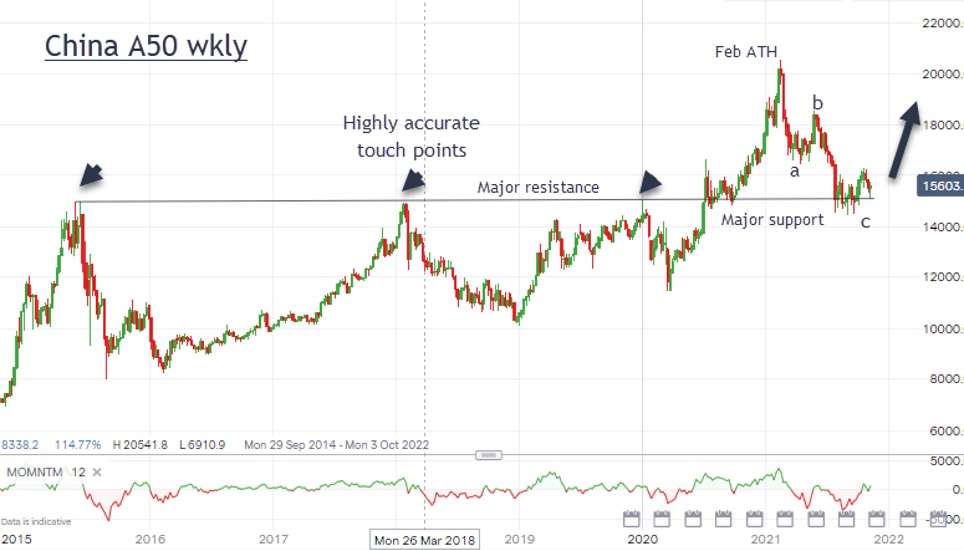Chart of the week: a ‘buy the dip’ opportunity with huge potential
15th November 2021 12:12
by John Burford from interactive investor
The Chinese stock market has plunged from its February peak, but our technical analyst is getting excited about a possible hot trade.

China is unloved – so is this a great buying opportunity?
I am taking a different tack this week and moving to China. Currently, there are very few UK investors who are looking at making investments in this country – and that is just one reason I am analysing the potential for a substantial rally at this time.
For UK investors who rarely stray far from these shores, this may be an opportune time to start looking East.
China is so out of favour, I had to scroll down a very long way to find the first China exchange-traded fund (ETF) on my trading platform. If I am correct, a massive short-squeeze here would ignite China shares and push them right up the list.
There are many UK-based funds and ETFs galore. I like the broad-based China A50* index of 50 of the largest-cap issues. There are many others.
Like most, I have been fascinated by the 40% (or more) crash in many Chinese equities since the February highs. That was when the Chinese authorities were cracking down on the huge tech companies they viewed as being too big for their boots.
Then the publicity-hungry CEO of Alibaba (NYSE:BABA) (the 'Amazon' equivalent), Jack Ma suddenly disappeared from view after criticising the authorities and has since popped up in Hong Kong and generally been keeping a low profile. But that little episode brought into sharp focus the immense power that the Chinese state wields. And with that power it has the ability to move markets.
In one sense, guessing where markets are headed is more an exercise in analysing China's politics than in using more conventional economic methods. Of course, this is also true in the West, with the heavy hand of the US Federal Reserve acting as the dominant player in setting global interest rates and bond yields.
The sharp move lower off the February highs has induced a highly bearish sentiment towards Chinese shares, which has been magnified by the property 'crash' as championed by the Evergrande (SEHK:3333) affair.
- US shares and Chinese bonds: the new 60/40 portfolio?
- Take control of your retirement planning with our award-winning, low-cost Self-Invested Personal Pension (SIPP)
But these negative developments are now old news, so has this 40% correction fully discounted the potential negative implications? I am unable to see why the authorities would want to trigger a full-fledged stock market and property crash, as that would totally undermine their power to govern. They have seen the 40% stock correction that has likely taught speculators a lesson and will likely ease off now.
That sets the stock market up for a likely huge rally phase, particularly if more conciliatory statements emerge. Remember, many hedge funds are net short China and will have to cover if the market rallies.
Here is the weekly chart that shows the very significant horizontal trendline starting in 2015 that separates resistance and support with high accuracy:

Past performance is not a guide to future performance
Providing the support area holds, the a-b-c decline (that always indicates a correction to the main trend) should herald a move up to at least test the old high at 20,500.
But any sharp and persistent decline below the trendline at around 15,000 would send me back to the drawing board.
This looks like a Buy the Dip opportunity with huge potential.
*There are a couple of options for investors wanting to track the Chinese stock market, but not the FTSE China A50 index specifically.
The Xtrackers Harvest FTSE China A-H 50ETF1D (LSE:AH50) tracks the FTSE China A-H 50 index. This index is composed of domestic (A) shares combined with some offshore Hong Kong-listed stocks (H shares). This would give investors exposure to offshore (Hong Kong) shares, which will have different characteristics and performance.
The iShares MSCI China A ETF USD Acc (LSE:CNYA) tracks the MSCI China A shares index. While this is a bigger index than the FTSE China A50 index, having over 400 constituents, it does only include domestic-listed (A) shares.
John Burford is the author of the definitive text on his trading method, Tramline Trading. He is also a freelance contributor and not a direct employee of interactive investor.
These articles are provided for information purposes only. Occasionally, an opinion about whether to buy or sell a specific investment may be provided by third parties. The content is not intended to be a personal recommendation to buy or sell any financial instrument or product, or to adopt any investment strategy as it is not provided based on an assessment of your investing knowledge and experience, your financial situation or your investment objectives. The value of your investments, and the income derived from them, may go down as well as up. You may not get back all the money that you invest. The investments referred to in this article may not be suitable for all investors, and if in doubt, an investor should seek advice from a qualified investment adviser.
Full performance can be found on the company or index summary page on the interactive investor website. Simply click on the company's or index name highlighted in the article.
Disclosure
We use a combination of fundamental and technical analysis in forming our view as to the valuation and prospects of an investment. Where relevant we have set out those particular matters we think are important in the above article, but further detail can be found here.
Please note that our article on this investment should not be considered to be a regular publication.
Details of all recommendations issued by ii during the previous 12-month period can be found here.
ii adheres to a strict code of conduct. Contributors may hold shares or have other interests in companies included in these portfolios, which could create a conflict of interests. Contributors intending to write about any financial instruments in which they have an interest are required to disclose such interest to ii and in the article itself. ii will at all times consider whether such interest impairs the objectivity of the recommendation.
In addition, individuals involved in the production of investment articles are subject to a personal account dealing restriction, which prevents them from placing a transaction in the specified instrument(s) for a period before and for five working days after such publication. This is to avoid personal interests conflicting with the interests of the recipients of those investment articles.